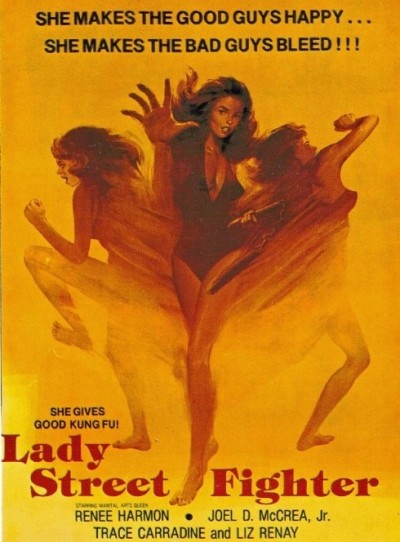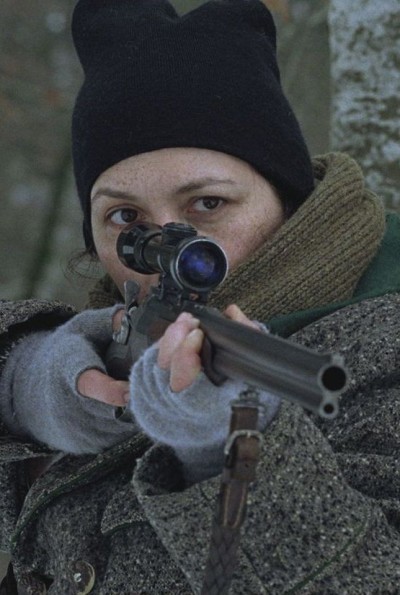½
“Legitimately terrible, among the worst films I’ve ever seen.”
 Let me start off by repeating myself, in case you missed it, because I want to be absolutely clear on these points. This is legitimately terrible. This is among the worst films I’ve ever seen. And I speak as someone with over 25 years of watching really bad films. That half-star is solely for amusement to be gathered from how bad this is, because there are basically no redeeming features here at all, and I speak as someone who will tolerate almost any pile of shit with an action heroine in it. This movie is largely responsible for the addition of the word “almost” to the previous sentence, despite being mercifully brief at a mere 72 minutes in length. The half-star is simply because I did reach the end without gnawing a limb off to escape. I think I deserve some kind of Internet prize for that.
Let me start off by repeating myself, in case you missed it, because I want to be absolutely clear on these points. This is legitimately terrible. This is among the worst films I’ve ever seen. And I speak as someone with over 25 years of watching really bad films. That half-star is solely for amusement to be gathered from how bad this is, because there are basically no redeeming features here at all, and I speak as someone who will tolerate almost any pile of shit with an action heroine in it. This movie is largely responsible for the addition of the word “almost” to the previous sentence, despite being mercifully brief at a mere 72 minutes in length. The half-star is simply because I did reach the end without gnawing a limb off to escape. I think I deserve some kind of Internet prize for that.
The problems start with the lead actress, Harmon, who is barely intelligible in English, to the extent that in her conversations, you largely have to listen to whoever she’s speaking to, and try to figure out what she said from their responses. Her acting talents are almost non-existent. but are probably better than her martial arts skills, which… just aren’t. Gives mean celery fellatio, however. Trust me, you don’t want to know. She plays Linda Allen, flies into the movie to investigate the death of her sister, apparently killed by the villains because she had a stuffed toy containing incriminating information. Ok, let’s pause here for a disclaimer. Please take the word “apparently” as read for the rest of the review, because this film does such a godawful job of explaining things, I’m not prepared to vouch for the accuracy of any plot point. I’m not even sure from which decade this dates. The IMDb says 1985, but the fashions are pure seventies, and judging by the near-sampling, the soundtrack was written when The Good, the Bad and the Ugly was still in theaters.
Allen is in trouble almost as soon as she arrives, with someone trying to stop her, though their efforts to silence her are woefully inept. There’s FBI agent Rick Pollard (McCrea), who may be undercover, may be crooked, and has thing for our heroine; John Verdes, who runs an escort agency; and Max Diamond, who is into drugs as well as “harder things,” (specifically, has an assassin for hire business), and has a foot fetish which would make Quentin Tarantino snort derisively. He holds parties which are the height of 60’s/70’s/80’s/whatever decadence – except for the guys incessantly chanting “Toga! Toga! Toga!”, who appeared to be on loan from Delta Tau Chi. It’s kinda hypnotic, in a “passing a multiple pile-up” kinda way; you find yourself guiltily wondering what horrors will be present around the next bend. The same goes for most of the film as it evolves, and Linda makes her way up the chain to find the truth about her sister’s death, with the help or otherwise of Pollard – it appears she particularly needs help, when clambering over any barrier above knee-high.
Awful on every conceivable level, I was unsurprised to discover the director was also responsible for one of the worst horror movies of all time, Don’t Go in the Woods and also, The Executioner Part II, which likely rivals this one for title of worst action film of all time. Such a broad scope of diverse talent can only be admired. If you can admire it from a distance, without actually having to watch any of his work, so much the better.
Dir: James Bryan
Star: Renee Harmon, Joel D. McCrea





 This film’s origins as a stage play are painfully apparent, and you can also see why the distributor’s felt it needed to have 45 minutes cut out before it could be released, as frankly, it’s a bit of a bore. The battle to recapture Orleans is the only action of note here, even though that represented the start of the Maid’s campaign to restore France to its proper ruler (Ferrer), rather than the end. After that, this more or less skips forward to his coronation, then Joan’s capture, spending the rest of the movie – and there’s a lot of it – going through the trial, and the railroading of the heroine into, first throwing herself on the church’s mercy, then recanting her recantation and returning to wearing men’s clothes, thereby sealing her fate. There’s not much here which you won’t have seen before, if you’ve seen any of the other versions of the story, touching the usual bases from Joan’s revelations that she’s going to be the saviour of France, through her trip to see the Dauphin, and so on. It does downplay the “voices” aspect, especially early on, perhaps a wise move since it’s difficult to depict, without making her seem like a religious fruitcake.
This film’s origins as a stage play are painfully apparent, and you can also see why the distributor’s felt it needed to have 45 minutes cut out before it could be released, as frankly, it’s a bit of a bore. The battle to recapture Orleans is the only action of note here, even though that represented the start of the Maid’s campaign to restore France to its proper ruler (Ferrer), rather than the end. After that, this more or less skips forward to his coronation, then Joan’s capture, spending the rest of the movie – and there’s a lot of it – going through the trial, and the railroading of the heroine into, first throwing herself on the church’s mercy, then recanting her recantation and returning to wearing men’s clothes, thereby sealing her fate. There’s not much here which you won’t have seen before, if you’ve seen any of the other versions of the story, touching the usual bases from Joan’s revelations that she’s going to be the saviour of France, through her trip to see the Dauphin, and so on. It does downplay the “voices” aspect, especially early on, perhaps a wise move since it’s difficult to depict, without making her seem like a religious fruitcake. This is a very different kind of GWG film: indeed, it could almost be called an inaction heroine movie. It starts from a very simple presence. A woman (Gedeck) wakes up in a cabin in the Austrian Alps. When she tried to head to a nearby village, the path is blocked by an unseen, impenetrable barrier that has sprung up overnight, and now defines the boundary of her world. Everyone outside is dead. What do you do? How do you survive, both short- and long-term? Could you handle the loneliness? Can you retain your humanity, when you are, apparently, the only human being left?
This is a very different kind of GWG film: indeed, it could almost be called an inaction heroine movie. It starts from a very simple presence. A woman (Gedeck) wakes up in a cabin in the Austrian Alps. When she tried to head to a nearby village, the path is blocked by an unseen, impenetrable barrier that has sprung up overnight, and now defines the boundary of her world. Everyone outside is dead. What do you do? How do you survive, both short- and long-term? Could you handle the loneliness? Can you retain your humanity, when you are, apparently, the only human being left? I might have enjoyed this more, if I hadn’t recently sat through 25 episodes of basically the same plot, in Blood+. Generic anime storyline, #7: supernatural entity, trying to bring about the end of the world because… That’s what they do? In this case, there are sages and witches, who balance good and evil. 500 years ago, however, one from each side united, and the offspring was Bayonetta (Tanaka). She is now taking out angels, but there’s also a religious cult preparing for the rebirth of their saviour, a journalist who blames Bayonetta for the death of his father, and a mysterious, very whiny little girl, who keeps calling her “Mommy”. Who that turns out to be will surprise no one.
I might have enjoyed this more, if I hadn’t recently sat through 25 episodes of basically the same plot, in Blood+. Generic anime storyline, #7: supernatural entity, trying to bring about the end of the world because… That’s what they do? In this case, there are sages and witches, who balance good and evil. 500 years ago, however, one from each side united, and the offspring was Bayonetta (Tanaka). She is now taking out angels, but there’s also a religious cult preparing for the rebirth of their saviour, a journalist who blames Bayonetta for the death of his father, and a mysterious, very whiny little girl, who keeps calling her “Mommy”. Who that turns out to be will surprise no one. What? Gina Carano in another action flick? Why was I not informed of this? After all, Haywire was an undeniably impressive entry in the genre, featuring some of the crunchiest mayhem seen in a while. Throw in that this was directed by Stockwell, who directed the hidden gem, Cat Run, and my interest was thoroughly piqued. Sadly, this isn’t up to the level of either, though certainly has its moments. Carano plays Ava Grant, an ex-junkie who met her other half, Derek (Gigandet) at a Narcotics Anonymous meeting, but whose murky past is clearly far beyond that of her husband. Ava’s father brought her up tough, and able to protect herself, basing her life on mantras such as, “Survivors have scars. Losers have funerals.” We see, in flashback, that she was an apt student.
What? Gina Carano in another action flick? Why was I not informed of this? After all, Haywire was an undeniably impressive entry in the genre, featuring some of the crunchiest mayhem seen in a while. Throw in that this was directed by Stockwell, who directed the hidden gem, Cat Run, and my interest was thoroughly piqued. Sadly, this isn’t up to the level of either, though certainly has its moments. Carano plays Ava Grant, an ex-junkie who met her other half, Derek (Gigandet) at a Narcotics Anonymous meeting, but whose murky past is clearly far beyond that of her husband. Ava’s father brought her up tough, and able to protect herself, basing her life on mantras such as, “Survivors have scars. Losers have funerals.” We see, in flashback, that she was an apt student.
 The briskly-moving piece of seventies trash is much beloved by Quentin Tarantino, and I have to agree with him about its merits. While some elements haven’t stood the test of time well, in other ways, it’s well ahead of its era, and there is, literally, never a dull moment here. Initially, the teenage girl gang are the Dagger Debs, a somewhat subservient bunch to their male counterparts, the Silver Daggers, and their leader, Dominic (Brauner). He’s paired up with the Debs’ #1, Lace (Lee), but has eyes for new girl Maggie (Nail), who is soon impressing Lace with her street smarts and toughness.
The briskly-moving piece of seventies trash is much beloved by Quentin Tarantino, and I have to agree with him about its merits. While some elements haven’t stood the test of time well, in other ways, it’s well ahead of its era, and there is, literally, never a dull moment here. Initially, the teenage girl gang are the Dagger Debs, a somewhat subservient bunch to their male counterparts, the Silver Daggers, and their leader, Dominic (Brauner). He’s paired up with the Debs’ #1, Lace (Lee), but has eyes for new girl Maggie (Nail), who is soon impressing Lace with her street smarts and toughness. Prince Six (Tan) is plotting rebellion against the legitimate government, but Ming (Chu) has obtained a piece of compromising evidence from a dying Imperial guard. Before he can deliver it, the seal proving his identity is lifted by Tang Lyn-Yu (Ng), who runs a circus troupe, but has set her amorous eyes on Mind. He returns to the troupe, to try and locate the seal, but also there, undercover, is Fire Devil (Lin), who has been tasked by Six with locating and destroying the evidence of his treachery. However, after her involvement in a battle which leaves a young child orphaned, along with her beginning to fall for Ming, she begins to question whether she is on the right side of the fight. It doesn’t count as much of a spoiler to say that it ends with Fire Devil taking on Six, in a finale which involves so many things blowing up, you’d be forgiven for thinking the title of the film was as given at the top.
Prince Six (Tan) is plotting rebellion against the legitimate government, but Ming (Chu) has obtained a piece of compromising evidence from a dying Imperial guard. Before he can deliver it, the seal proving his identity is lifted by Tang Lyn-Yu (Ng), who runs a circus troupe, but has set her amorous eyes on Mind. He returns to the troupe, to try and locate the seal, but also there, undercover, is Fire Devil (Lin), who has been tasked by Six with locating and destroying the evidence of his treachery. However, after her involvement in a battle which leaves a young child orphaned, along with her beginning to fall for Ming, she begins to question whether she is on the right side of the fight. It doesn’t count as much of a spoiler to say that it ends with Fire Devil taking on Six, in a finale which involves so many things blowing up, you’d be forgiven for thinking the title of the film was as given at the top. There’s something almost theatrical about this, because virtually the entire film takes place in a single location, the downscale home of Lorna (Gershon), who has just knocked her husband Dale (Kilmer) out with a frying-pan, after discovering he was apparently involved in a bank robbery which netted $100,000. She has now called over her best friend, local barmaid Tiny (Giddish), to try and decide what to do next, with the first step being to find the loot, which Lorna is convinced Dale has hidden somewhere in their home. However, the local sheriff (Liotta) is also sniffing around, being fully aware of Dale’s fondness for armed robbery in his younger days. It’s not long before the dead bodies are piling up, requiring alternative uses to be found for the turkey carver and industrial-strength blender. And that’s just the start of the unpleasantness.
There’s something almost theatrical about this, because virtually the entire film takes place in a single location, the downscale home of Lorna (Gershon), who has just knocked her husband Dale (Kilmer) out with a frying-pan, after discovering he was apparently involved in a bank robbery which netted $100,000. She has now called over her best friend, local barmaid Tiny (Giddish), to try and decide what to do next, with the first step being to find the loot, which Lorna is convinced Dale has hidden somewhere in their home. However, the local sheriff (Liotta) is also sniffing around, being fully aware of Dale’s fondness for armed robbery in his younger days. It’s not long before the dead bodies are piling up, requiring alternative uses to be found for the turkey carver and industrial-strength blender. And that’s just the start of the unpleasantness. Boo (Chow) owns a failing boxing gym, and largely survives only by catering to masochistic geeks, with fantasies of being beaten up by Lara Croft, etc. To try and recoup customers driven away by her abrasive style, she hires the bubbly Miu (Lo), as a replacement for childhood friend TT (Yu), with whom she broke up after a spat over a man. Just as Miu brokers a reconciliation, the trio get an unexpected job offer, to work in Indonesia as bodyguards for the mysterious Lady Zhuge (Tong). Except, they eventually discover, this was just a lure to bring them in as fresh meat for her all-female fight club, where they must battle to the death.
Boo (Chow) owns a failing boxing gym, and largely survives only by catering to masochistic geeks, with fantasies of being beaten up by Lara Croft, etc. To try and recoup customers driven away by her abrasive style, she hires the bubbly Miu (Lo), as a replacement for childhood friend TT (Yu), with whom she broke up after a spat over a man. Just as Miu brokers a reconciliation, the trio get an unexpected job offer, to work in Indonesia as bodyguards for the mysterious Lady Zhuge (Tong). Except, they eventually discover, this was just a lure to bring them in as fresh meat for her all-female fight club, where they must battle to the death. ★★★
★★★ All three, however, were clearly selected as much for their visual appeal, and the 25th century is not short of beautiful people – it’s also quite warm, going by the ah, flimsy clothing worn by the trio. Cleo and her former profession fit right in. But taking any of this seriously would largely be doing the show a disservice, because it’s clear it doesn’t take itself seriously. There isn’t really time for that kind of thing, with each episode barely 20 minutes, excluding opening (theme song sung by Torres, a funked-up and lyrically altered version of Zager and Evans’ one-hit wonder, In the Year 2525) and closing credits. There isn’t much time for anything, in fact: both characterization and plotting remain about as scanty as the outfits. Hel is thoughtful but can be distant; Sarge likes shooting things first and asking questions later; Cleo, to be honest, is mostly irritating, coming over as both whiny and rather vacuous.
All three, however, were clearly selected as much for their visual appeal, and the 25th century is not short of beautiful people – it’s also quite warm, going by the ah, flimsy clothing worn by the trio. Cleo and her former profession fit right in. But taking any of this seriously would largely be doing the show a disservice, because it’s clear it doesn’t take itself seriously. There isn’t really time for that kind of thing, with each episode barely 20 minutes, excluding opening (theme song sung by Torres, a funked-up and lyrically altered version of Zager and Evans’ one-hit wonder, In the Year 2525) and closing credits. There isn’t much time for anything, in fact: both characterization and plotting remain about as scanty as the outfits. Hel is thoughtful but can be distant; Sarge likes shooting things first and asking questions later; Cleo, to be honest, is mostly irritating, coming over as both whiny and rather vacuous.







